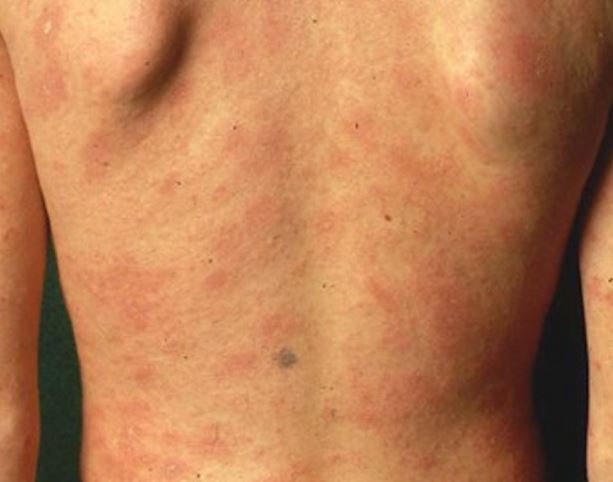A 22 y.o. who works at the ballpark comes in with a pruritic rash which has been present for three weeks.
What is it?
Our patient had pityriasis rosea. This is a scaly rash first described by Gibert in 1860. The name means “fine pink scale”. It is a common disorder observed in healthy people. The age range is usually 10-35.
It is a benign rash but will last for 6-8 weeks often prompting an emergency room visit. It usually begins with a patch that heralds the eruption, the so-called “herald patch”. A few days to a few weeks later the rash will generalize. The secondary lesions are smaller than the herald patch and may have a collar of scale. The lesions can follow skin tension lines (Langer lines) on the upper trunk leading to a Christmas tree pattern. The rash can lead to hypopigmented areas which take months to resolve.
the rash can follow rib lines “A Christmas tree “ rash.
While not proven, it is thought that human herpesvirus HHV-6 and /or HHV-7 can cause the disease. More recently, COVID-19 has been associated with several cases.
ETIOLOGY
o Herpesviruses 6 and 7 (HHV-6/7) have the strongest known association, however studies have not been confirmatory.
o Other viral infections, such as H1N1 influenza A and COVID-19, may also be causative.
Drug-induced reactions
o Many drugs have been associated, such as angiotensin-converting enzyme inhibitors, nonsteroidal anti-inflammatory drugs, hydrochlorothiazide, gold, captopril, atypical antipsychotics barbiturates, D-penicillamine, imatinib, metronidazole, isotretinoin, clozapine, and clonidine.
Vaccines
o Pityriasis rosea may be triggered by the Bacillus Calmette-Guerin (BCG), H1N1, diphtheria, smallpox, hepatitis B, Pneumococcus, and COVID-19 vaccines.
syphilis can mimic pityriasis
DIFFERENTIAL DIAGNOSIS-these may look similar but do not have a herald patch.
Lichen planus- is a scaly rash that can occur inside the mouth as well as on the skin. It has been associated with Hep C, vaccines, drugs(beta blockers and ACE inhibitors) and metal dental fillings.
lichen planus is another scaly rash
Psoriasis- scaly lesions appear on the knees, elbows, and scalp.
Erythema Multiforme – can occur after a viral infection and often presents with a target lesion.
Syphilis- the great imitator can look similar to pityriasis
Tinea-/Id Reaction(Autoeczematization)- this is a cutaneous eruption which can occur after infection with Tbc, molluscum, or even athletes foot fungus. It is thought to be a hypersensitivity reaction which triggers an eczema-like rash.
The Id reaction occurs as hypersensitivity to fungus as in this 17 y.o. The fungus must be treated.
Our patient received reassurance and symptomatic treatment.
Drago F, Ranieri E, Malaguti F, et al. Human herpesvirus 7 in patients with pityriasis rosea. Electron microscopy investigations and polymerase chain reation in mononuclear cells, plasma and skin. Dermatol. 1997;195(4) :374-8.
Veraldi S, Romagnuolo M, Benzecry V. Pityriasis rosae-like eruption revealing COVID-19. Australas J Dermatol 2020 Nov 20: 10.1111/adj 13504. Doi:10.2222/ajd.13504.
Leung A, Lam J, Leong K, Hon K. Pityriasis rosea: an updated review. Curr Pediatr Rev. 2021;17(3):201-211.
Iglesias M, Wspana A, Idoate M, et al. Generalized skin reaction following tinea pedis (dermatophytids). J Dermatol. 1994;21:31-34.





